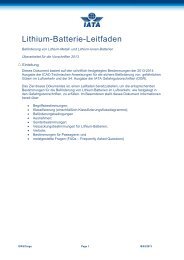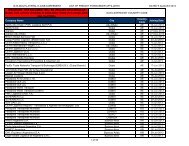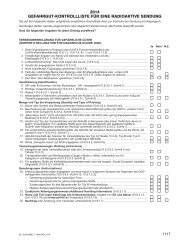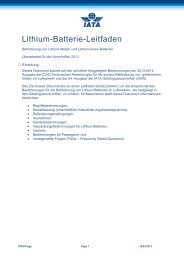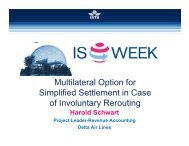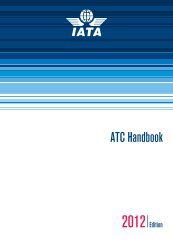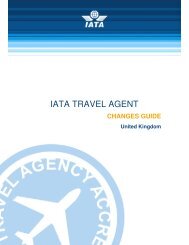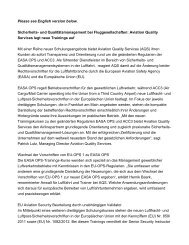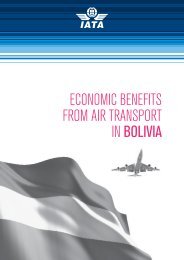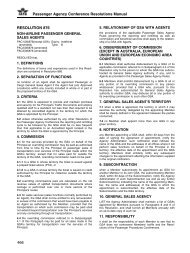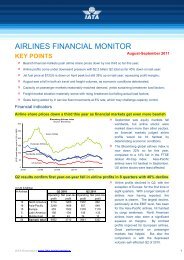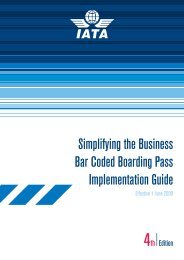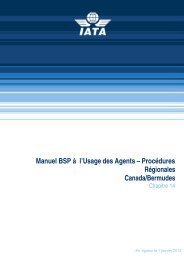Create successful ePaper yourself
Turn your PDF publications into a flip-book with our unique Google optimized e-Paper software.
Governments are also creating<br />
unnecessary confusion<br />
over slot guidelines.<br />
<strong>IATA</strong>’s Worldwide Slot<br />
Guidelines (WSG) are the<br />
accepted standard for the management<br />
of airport slots and<br />
must be globally implemented.<br />
The European Commission<br />
proposal for a new slot regulation<br />
departs from international<br />
standards.<br />
<strong>IATA</strong> is working toward the<br />
global adoption of a standard<br />
slot management process<br />
for the benefit of the whole<br />
industry. The WSG provide the<br />
guiding principles, policy, and<br />
procedures of slot management<br />
and are a proven process<br />
for optimizing the utilization of<br />
scarce airport capacity.<br />
The<br />
80/20<br />
rule<br />
Any departure from such an international<br />
standard negatively<br />
affects the airlines, the airports,<br />
and ultimately the passenger.<br />
The European Commission’s<br />
proposal to move from the<br />
usual 80-20 “use it or lose it”<br />
slot rule to an 85-15 rule in the<br />
mistaken belief that this will<br />
improve airport slot utilization is<br />
a case in point.<br />
The 80-20 rule achieves utilization<br />
rates at the most congested<br />
airports in excess of 95%. If<br />
the new proposals are adopted,<br />
the result could be an increase<br />
in empty flights to protect<br />
slots, which as well as being<br />
financially and environmentally<br />
95%<br />
utilization<br />
At the most congested<br />
airports the 80/20 rule<br />
delivers utilization rates<br />
of 95% or more.<br />
28<br />
damaging does not achieve the<br />
objective of a more efficient use<br />
of capacity<br />
<strong>IATA</strong> will advocate against<br />
these changes in <strong>2012</strong>. They<br />
are enormously detrimental to<br />
the global process and could<br />
provoke international retaliation.<br />
<strong>IATA</strong> will also continue to<br />
discuss how best to manage<br />
congestion at New York–area<br />
airports with the United States<br />
Federal Aviation Administration.<br />
The key to managing capacity<br />
is building more airports<br />
and runways.<br />
Slot management issues are a<br />
distraction from the main reason<br />
for a lack of capacity in the<br />
aviation system, which is that<br />
there are not enough runways<br />
and terminals to cope with<br />
demand. <strong>IATA</strong> continually works<br />
with businesses and trade<br />
unions to promote the benefits<br />
of responsible, sustainable<br />
growth at constrained airports.<br />
Examples include campaigning<br />
for a third runway at London<br />
Heathrow and at Hong Kong<br />
International Airport. The best<br />
use of existing infrastructure<br />
is also vital. <strong>IATA</strong> has worked<br />
closely with aviation stakeholders<br />
in Germany to communicate<br />
the economic consequences of<br />
the decision to ban night flights<br />
at Frankfurt airport.<br />
161<br />
airports<br />
Fully 161 of the most<br />
congested airports in<br />
the world require official<br />
coordination and apply<br />
the 80/20 rule.



